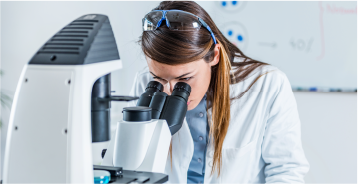Epigenetics and addiction – why quitting is more than just sheer willpower
 Health and Wellness
Health and Wellness
We need to process your personal information for you to interact with this website. We also use Cookies to enhance your experience. Please accept the Website Ts and Cs and Data Protection and Privacy Policy to fully access the website.
During Youth Month, we don’t just celebrate the bravery and determination of the youth of yesterday but look forward to the possibilities for change that the youth of today hold in their hands. Vitally, by empowering the youth through health education, we create a stronger, healthier tomorrow. Here’s how.
The importance of health education
Health education is a critical component of youth development. It provides young people with the knowledge they need about their health and wellbeing to impact it significantly and positively. Moreover, it enables young people to pursue careers in healthcare. The careers of the next generation of nurses, doctors, psychologists, and more start today.
In South Africa, where many communities face enormous challenges in getting access to quality healthcare, empowering youth through health education is especially important.
Health education is a wide-ranging field that includes nutrition, sexual and reproductive health, mental health, exercise and more. Combatting the stigma around mental health is especially important.
Most importantly, health education isn’t about lecturing young people. It’s about getting them involved from the ground up, designing the programmes, setting the topics, and delivering the message through their active participation.
Where to start
Health education isn’t just a public sector responsibility. It’s the entire country’s responsibility. It doesn’t just have to come from those who have the knowledge. Because health challenges are both systemic and generational, parents also need to get involved. They need to admit what they don’t know and realise that there’s no such thing as a stupid question. There are just questions.
Some of the most important challenges to address are:
Sexual and reproductive health: Teenage pregnancy is a serious problem in South Africa. The consequences for both the mothers and children can be lifelong and devastating. Comprehensive sex education isn’t just about making informed decisions about relationships and sex, and access to contraceptives; it also needs to address issues like gender equality, gender-based violence and consent. A truly equal society is built on the foundations of respect for each other’s humanity.
According to a Stats SA report, adolescent girls face additional threats at puberty. A total of 106 383 registered live births occurred among adolescents aged 10 to19 years in 2019.
Like Archbishop Desmond Tutu said, “My humanity is bound up in yours, for we can only be human together.”
Mental health: Battling the stigma around mental health is one of the first steps. You can’t address the issues without building the desire to seek help first. Depression and anxiety are critical areas of concern. Schools and community programmes need to incorporate mental health education as a daily reminder. This is critical to creating supportive environments where young people feel safe to discuss their concerns or feelings.
Environmental health: Environmental health isn’t just about taking care of your immediate space. It addresses the effects of pollution on health, like the microplastic crisis, littering, and more. Looking after your environment is just as important as looking after yourself. It’s the reflection of who you are and the respect you have for yourself and others.
Participation is key
Without participation, any efforts will be futile. To be effective, health education initiatives need to be inclusive, engaging, and tailored to the people they need to reach.
Participation: Participation doesn’t just include getting young people to listen to speeches. It is a ground-up approach that includes getting young people involved in the design and delivery of health education programmes. Generational differences can make it nearly impossible to connect with young people. The content needs to be relevant and delivered by the people it wants to reach. Peer education models, where trained young people educate their peers, can be particularly effective, and ensure that young people are trained in healthcare early on, giving them a solid foundation to pursue a career in healthcare as well.
Cultural relevance: One of South Africa’s greatest strengths is its cultural diversity. This also means that any health programmes must both respect the culture of the people involved and incorporate their values and beliefs.
A holistic approach: Health education should address the holistic needs of young people, integrating physical, mental, and emotional health topics. This comprehensive approach helps youth understand the interconnectedness of different aspects of health.
For Bestmed members aged 16 years and older, the Tempo wellness programme offers you the perfect starting point to your healthy living journey.
The Tempo Fitness Journey gives you access to one (1) face-to-face and a follow-up (face-to-face or virtual) consultation with Tempo partner biokineticists for fitness assessments and personalised exercise plans.
The Tempo Nutrition Journey gives you access to one (1) face-to-face and a follow-up (face-to-face or virtual) consultation with Tempo partner dietitians for nutritional assessments and personalised eating plans.
And the Tempo Emotional Wellbeing Journey gives you lifestyle related information that will help you deal with life’s changes and curveballs; and practical challenges that will enable you to practice the new skills you have to acquire to progress from your current emotional and mental state to your desired state.
References:
Health Education. CDC. Accessed 2024. Available here.
These are the mental health challenges SA’s youth are facing. The Citizen. 2023. Available here.
Adolescent Mental Health. Unicef. Accessed 2024. Available here.
Profiling health challenges faced by adolescents (10-19 years) in South Africa. Stats SA. 2015. Available here.
The Young and the Restless – Adolescent Health in SA. Stats SA. Accessed 2024. Available here.
Health education for young people: Approaches and methods. National Library of Medicine. Accessed 2024. Available here.